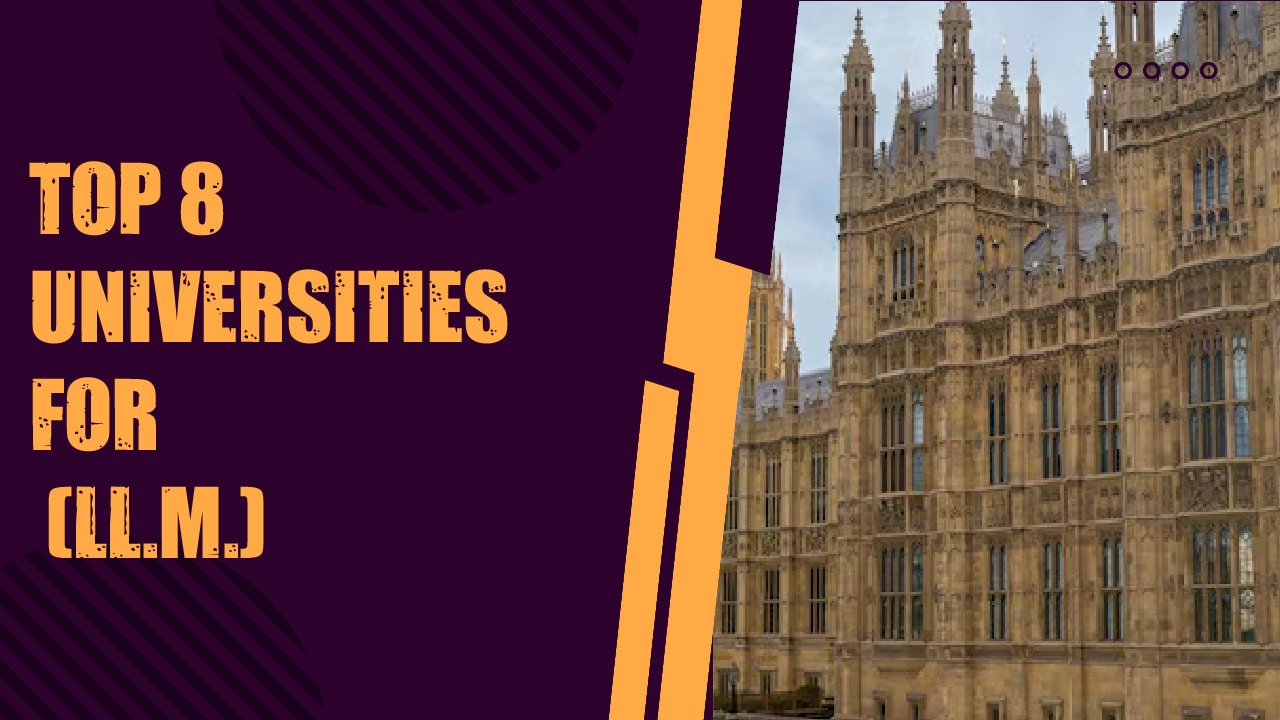Top 8 Universities for Master of Law (LL.M.) Students in the UK
Pursuing a Master of Law (LL.M.) can be a transformative step for legal professionals seeking to deepen their expertise and enhance their career prospects. The UK is home to some of the world’s most prestigious universities, offering diverse and specialized LL.M. programs. Here’s a detailed look at eight top universities in the UK known for their outstanding LL.M. programs.
1. University of Oxford
Overview: The University of Oxford, one of the oldest and most esteemed universities globally, offers an LL.M. program that stands out for its academic rigor and historical significance. The university’s Faculty of Law is renowned for its research and teaching excellence.
Program Highlights:
- Course Structure: Oxford’s LL.M. program is known as the Bachelor of Civil Law (BCL) and is a one-year full-time course or two-year part-time course.
- Specializations: The program offers a range of modules including International Law, Human Rights Law, and Constitutional Law.
- Reputation: Oxford’s LL.M. benefits from a distinguished faculty and a global network of alumni.
Pros:
- Access to a world-class faculty and extensive research resources.
- A prestigious qualification that is highly respected worldwide.
- Opportunities for interdisciplinary study and networking.
Cons:
- Highly competitive entry requirements.
- Expensive tuition fees and living costs.
2. University of Cambridge
Overview: The University of Cambridge, another prestigious institution, offers a highly regarded LL.M. program through its Faculty of Law. Cambridge’s program is known for its comprehensive curriculum and strong emphasis on research.
Program Highlights:
- Course Structure: The LL.M. at Cambridge is typically completed in one year of full-time study.
- Specializations: Students can choose from various specializations including Commercial Law, International Law, and Human Rights.
- Reputation: Cambridge’s LL.M. program is noted for its academic excellence and influential faculty.
Pros:
- Strong emphasis on research and critical analysis.
- Opportunities to engage with leading legal scholars and practitioners.
- Access to Cambridge’s extensive library and research facilities.
Cons:
- High cost of tuition and living expenses.
- Intense competition for admission.
3. London School of Economics and Political Science (LSE)
Overview: The London School of Economics and Political Science (LSE) is renowned for its expertise in legal and economic studies. LSE’s LL.M. program is one of the most diverse in the UK, offering a wide range of specializations.
Program Highlights:
- Course Structure: LSE offers a one-year full-time or two-year part-time LL.M. program.
- Specializations: The program includes specializations such as Banking Law, Human Rights Law, and International Business Law.
- Reputation: LSE is known for its strong focus on the practical and theoretical aspects of law and its global network.
Pros:
- Diverse range of specializations and elective modules.
- Strong connections with legal and business communities.
- Located in the heart of London, providing excellent networking opportunities.
Cons:
- High tuition fees.
- The competitive nature of the program.
4. King’s College London
Overview: King’s College London offers a highly regarded LL.M. program through its Dickson Poon School of Law. Known for its international focus and strong academic foundation, King’s College is a leading choice for LL.M. students.
Program Highlights:
- Course Structure: The LL.M. can be completed in one year full-time or two years part-time.
- Specializations: Offers specializations including International Arbitration, Human Rights Law, and Commercial Law.
- Reputation: The program is well-regarded for its academic rigor and practical relevance.
Pros:
- Strong focus on international and comparative law.
- Access to a diverse and vibrant academic community.
- Opportunities for research and practical experience.
Cons:
- Higher tuition fees compared to some other institutions.
- The intensity of the program can be demanding.
5. University College London (UCL)
Overview: University College London (UCL) is known for its strong emphasis on interdisciplinary studies and research. UCL’s LL.M. program is well-regarded for its comprehensive curriculum and academic excellence.
Program Highlights:
- Course Structure: UCL offers a one-year full-time or two-year part-time LL.M. program.
- Specializations: The program includes specializations such as International Law, Environmental Law, and Corporate Law.
- Reputation: UCL is noted for its innovative approach to legal education and research.
Pros:
- Wide range of specializations and research opportunities.
- Strong focus on interdisciplinary studies.
- Located in London, providing excellent professional and cultural opportunities.
Cons:
- High cost of living and tuition.
- Competitive admissions process.
6. University of Edinburgh
Overview: The University of Edinburgh, with its School of Law, offers a distinguished LL.M. program known for its academic rigor and comprehensive curriculum. Edinburgh’s program is recognized for its global perspective and research opportunities.
Program Highlights:
- Course Structure: The LL.M. at Edinburgh is a one-year full-time or two-year part-time program.
- Specializations: Specializations include International Law, Human Rights, and Intellectual Property Law.
- Reputation: Edinburgh’s LL.M. program benefits from a strong academic reputation and research facilities.
Pros:
- Strong focus on research and global issues.
- Supportive academic environment with opportunities for interdisciplinary work.
- Historic and vibrant city with a rich cultural scene.
Cons:
- Tuition fees can be high for international students.
- The program may not be as internationally recognized as those from some London-based universities.
7. University of Bristol
Overview: The University of Bristol offers a dynamic LL.M. program through its Faculty of Law. Known for its strong academic focus and research opportunities, Bristol is a popular choice for LL.M. students.
Program Highlights:
- Course Structure: Bristol’s LL.M. can be completed in one year full-time or two years part-time.
- Specializations: Specializations include Human Rights Law, Commercial Law, and International Law.
- Reputation: Bristol is noted for its rigorous academic program and research output.
Pros:
- Strong academic and research focus.
- Supportive and collaborative learning environment.
- Affordably priced compared to some other top institutions.
Cons:
- Less international visibility compared to London-based universities.
- Limited specialization options compared to larger programs.
8. University of Manchester
Overview: The University of Manchester offers an LL.M. program that is well-regarded for its academic excellence and comprehensive curriculum. Known for its research-oriented approach, Manchester provides a solid foundation for LL.M. students.
Program Highlights:
- Course Structure: Manchester offers a one-year full-time or two-year part-time LL.M. program.
- Specializations: The program includes options such as International Business Law, Human Rights, and Intellectual Property Law.
- Reputation: Manchester is recognized for its strong research output and academic quality.
Pros:
- Research-driven program with a focus on academic excellence.
- Affordable tuition compared to some other top universities.
- Strong connections with industry and legal professionals.
Cons:
- Less global recognition compared to some London-based universities.
- Fewer specialization options compared to larger institutions.
Conclusion
Choosing the right university for an LL.M. program can significantly impact your career trajectory and academic experience. The University of Oxford, University of Cambridge, LSE, King’s College London, UCL, University of Edinburgh, University of Bristol, and University of Manchester all offer exceptional LL.M. programs, each with its unique strengths and specializations. Whether you’re looking for a prestigious institution with global recognition or a program with a strong focus on research and practical experience, these universities provide diverse and comprehensive options to meet your academic and professional goals








